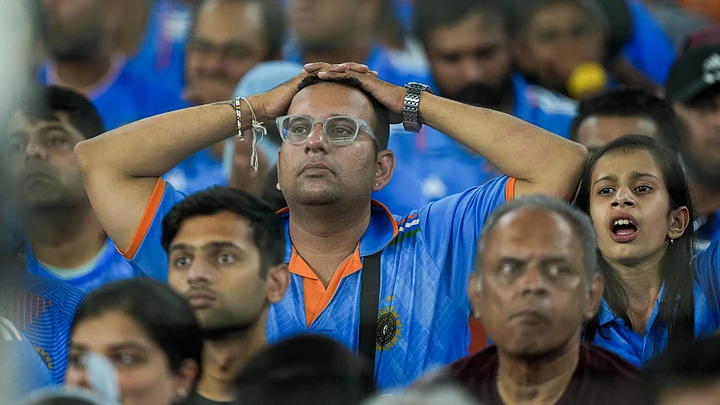A stadium designed for 1.32 lakh people stood still and motionless as India’s World Cup dreams unravelled right in front of them. There were brief moments of magic and mayhem that inspired pandemonium in the stands, sure.
The packed stadium was up on their feet collectively losing their minds when Rohit Sharma was doing his thing or when Virat Kohli smashed three consecutive boundaries off Mitchell Starc. But besides those, and the breathless breakthroughs with the ball launched by Bumrah and Shami, the Narendra Modi Stadium, on Sunday, resembled a graveyard of utter silence more than a bouncing, jumping carnival of cricket.
How did that come to pass? It was supposed to be India’s coronation moment on the grandest stage of the game. The tournament had revolved entirely around them and their fans and yet, an almost certain dream of ending a decade-long wait for glory quickly turned into a nightmare of unimaginable proportion.
“In sport, there’s nothing more satisfying than hearing a big crowd go silent,” said Australian captain Pat Cummins in the build-up to the final. And so they did.
Australia’s bowlers bowled teasing Test match lengths, their fielders took outrageous catches and threw their bodies around the field like their lives depended on it despite being under the hot and sultry Ahmedabad sun, and they restricted the Indian batters to just 13 boundaries and three sixes in a 50-over innings.
By the time Mohammed Shami came out to bat in the 44th over, with the score at 211/7, the crowd had already mentally checked out. The hope of Suryakumar Yadav reviving and resuscitating the innings with the kind of trail-blazing knocks that he’s made a career out of faded with the passing of every single over and reached a point of submission by the time India were bundled out for 240.
Hope found a way back into the sea of blue at Motera when Bumrah and Shami found a way to make a contest out of the final after pegging Australia to 47/3. With the visitors’ batters firmly under pressure, the leaders of India’s pace attack continued to look for ways to make inroads. They found the edges and their balls just fell short of kissing the off-stump by a margin of millimeters but much to their dismay and the whole of India, no wicket fell.
Little did those in attendance know that the dismissal of Smith was the final time that they would raise their voices that night as Marnus Labuschagne joined forces with Travis Head at the crease.
The DJ tried to egg the audience on, but he failed. Virat Kohli flung his arms asking for support, but he couldn’t. Bumrah’s leg before review of Head lit a flame but the fire was doused almost as quickly as it burned after the big screen displayed umpire’s call. Shoulders sunk, hearts raced, faces turned pale, nails were destroyed, and silence. Just silence.
Over 1 lakh people and yet, it was Travid Head’s willow that sang the loudest. So by the time he got to the three-figure-mark, becoming only the third Australian to manage that incredible feat in a World Cup final, after Ricky Ponting and Adam Gilchrist, the fans decided that they’d seen enough and headed for the exit gates.
What should’ve been the night of their lives and a grand collective party had turned into a game with a familiar end. Murmurs of “How is this happening?” and “These players deserve better!” started to find a vent around me as resignation took over Motera. Thoughts of families, the next Monday at work, the frustration with their jobs came flooding. For the first time since the World Cup began on 5 October, cricket wasn’t the first priority.
To draw parallels from another sport, this was India’s Maracanazo. Seven decades ago and in front of a reported attendance of over 1,70,000 in Rio de Janeiro, the great Brazilian football team lost the 1950 FIFA World Cup final to Uruguay. An entire country was so invested in the success of the national side that it wasn’t emotionally prepared for a defeat. The final chapter of a World Cup that had been all about the celebration of Brazil and its people ended in a tragedy that collectively paralysed the entire country.
As Brazil did back then and India has so painfully realised now, people can roll out their red carpets, build their theatres of spectacle, preach nationalism in front of a global audience through sport, practice their celebratory speeches with chest-thumping bravado all they like. But in sport, as in life, nothing is owed.
“It takes one day” was the motto of the Cricket World Cup 2023. It took exactly that for months of hard work from the players and support staff and weeks of anticipation, excitement, and investment from the fans to meet its demise. One bad day and everything had come crashing down.
The grief may seem never-ending right now but the night of terror will inevitably pass. All we can do is batten down the hatches, let the tears come, head to the shower, and close our eyes for, as Rahul Dravid so immaculately put in the press conference after the final, “The sun will come up tomorrow morning.”
(At The Quint, we question everything. Play an active role in shaping our journalism by becoming a member today.)
